State media English-language coverage of Belarus propagates claims of Western interference
Pro-Kremlin outlets unsuccessfully push narrative that
State media English-language coverage of Belarus propagates claims of Western interference
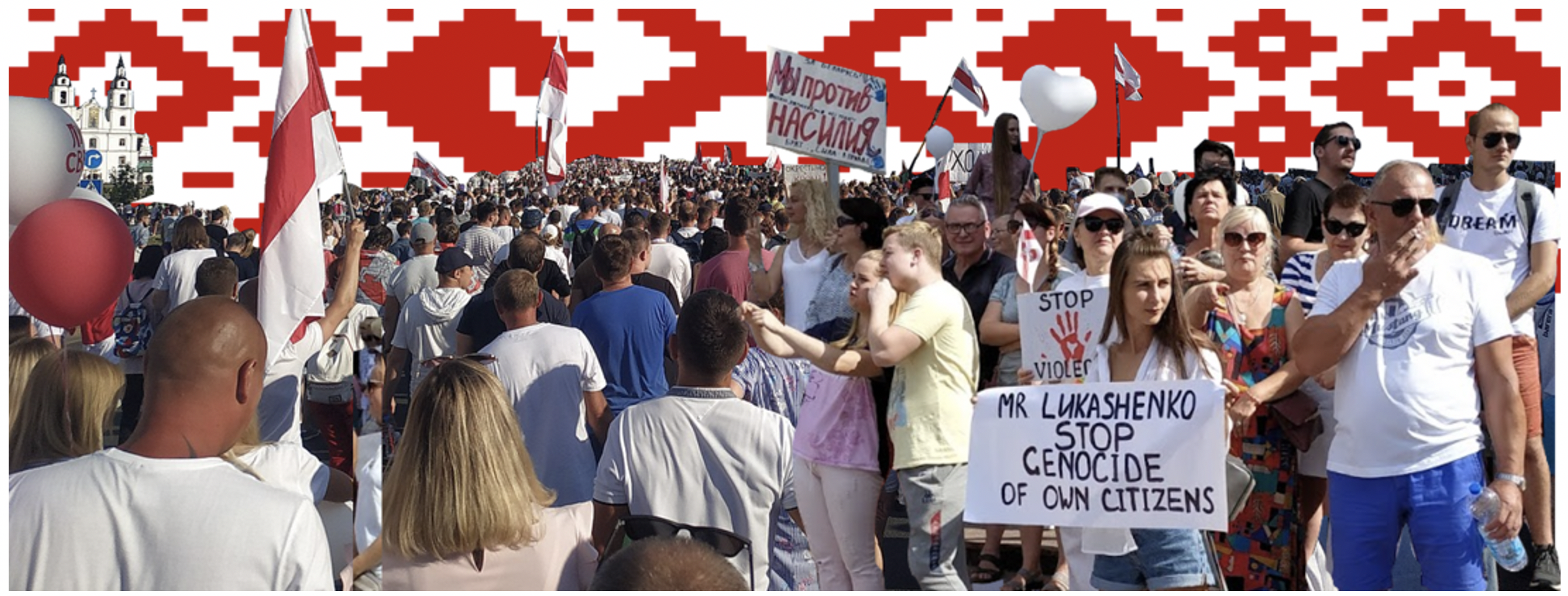
Pro-Kremlin outlets unsuccessfully push narrative that ongoing protests are yet another “color revolution” supported by the West
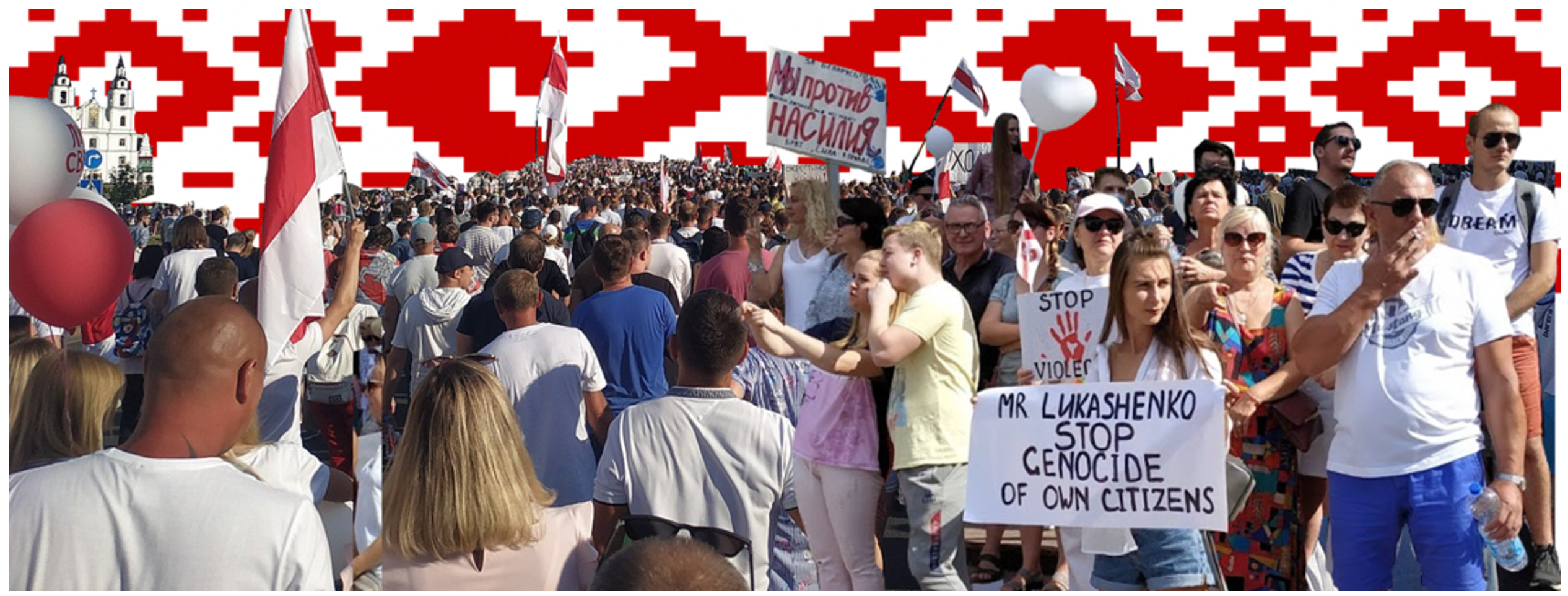
Belarusian and Russian media are pushing a narrative through their English-language affiliate outlets that the pro-democracy protests taking place in Belarus are instead an illegitimate coup or “color revolution” propelled by the U.S. and EU.
Over many years, Russia has consistently deployed the narrative of Western meddling to explain pro-democracy “color revolutions” in Eastern Europe and Eurasia. Russian disinformation has previously claimed that Ukraine’s 2014 Euromaidan Revolution was the result of Western powers and Ukrainian nationalists working together to depose a legitimate government. In 2018, when thousands of Armenians took to the streets to protest peacefully against Serzh Sargsyan’s third consecutive term as president, leading to his eventual resignation, Russia asserted that this “color revolution” undermined Armenian values and would endanger the country’s security. Similarly, Russia claimed that the 2019 Gavrilov’s Night protests in Georgia were organized by Western governments with the aim of making Georgia into a client state of the U.S. military. Meanwhile, the DFRLab previously reported on the Russian media’s insistence that the 2019 Moscow protests were the consequence of foreign actors subverting the sovereignty of their nation.
The recycled narrative of foreign interference delegitimizes protesters and supports the Lukashenka regime’s violent repression of Belarusians citizens, as well as Russia’s objective of maintaining regional alliances it sees as beneficial. Further, pro-Kremlin disinformation seeks to dismiss events in Belarus by conflating the unrest and electoral challenge in the country with similar instances in the United States as a means of promoting mistrust among U.S. audiences in their own government, as the U.S. moves toward its own presidential election in November 2020.
English-language reporting from Belarusian media
Belarusian media promoted the foreign interference narrative to justify President Lukashenka’s crackdown on protesters and reinforce the claim that he is the legitimate leader of the country. Prior to the presidential election, Lukashenka attempted to delegitimize the opposition by linking it to vaguely defined foreign actors. On June 25, 2020, BelTA, a state-owned news agency that publishes English-language news about the country, claimed that foreign actors were seeking to intervene, reporting that Americans, NATO forces, or Ukrainians may be working to undermine the election. BelTA republished the same story on June 26 in video format. On August 6, BelTA relayed Lukashenka’s warning that the U.S. and NATO are engaged in a hybrid war with Belarus, having allegedly deployed covert forces to destabilize the election; in response, Belarusian authorities detained six individuals holding U.S. passports supposedly connected to the U.S. Department of State. Russian outlets TASS and RT republished the story, possibly to deflect coverage of the arrest of Russian-supported Wagner mercenaries on July 29, an incident that RT previously falsely claimed to be linked to the Ukrainian intelligence services.

Following the outbreak of unrest and calls for the president’s resignation, Lukashenka doubled down on claims of foreign interference, referring to the Czech Republic, Poland, and the Baltic states as “puppeteers.” The Belarusian foreign ministry, meanwhile, released a statement blaming civil unrest on “outside forces.” As the opposition movement has expanded over the past week, Belarusian officials have continued to link it to foreign interference. BelTA amplified these claims to English-language audiences on social media via its Twitter account and Facebook page, where these articles received little engagement due to a low aggregate following.
English-language reporting from Russian media
Russia overtly disseminated English-language disinformation about the protests in Belarus to international audiences through its foreign ministry and supported this narrative through RT and its network of state-supported media outlets. While BelTA circulated the foreign interference narrative to support Lukashenka’s retention of power, Russia deployed narratives to draw false equivalency between the Belarusian protests and mass protests that have occurred in the West. By doing so, these narratives dismissed reporting of Russian military assets deployed to Belarus while simultaneously delegitimizing both the democratic movement taking place in Belarus and democratic institutions in the West.
On August 13, Russian Ministry of Foreign Affairs (MFA) spokeswoman Maria Zhakarova rebutted reports that Russia sought to interfere in Belarus, stating, “there have been signs pointing in a different direction,” and noting that Russia “observed unprecedented pressure exerted on Belarusian authorities by some foreign partners. There are clear attempts of foreign interference in the affairs of a sovereign state to split society and destabilize the situation.” Speaking to TV channel Russia-1, Foreign Minister Sergei Lavrov alleged that outside forces are attempting to create a profitable situation for themselves and not for the Belarusian people. The Russian MFA amplified the narrative of foreign interference via its English-language Twitter account but received only low-to-moderate engagement.

In the week following the Belarusian election, RT published content affirming the MFA’s position. For example, RT released numerous op-eds claiming that the ongoing protests in Belarus are not representative of the Belarusian populace’s desires, but that the protests were instead the product of Western actors intervening out of geopolitical and economic interest and an unfounded adversarial stance toward Russia and its allies.
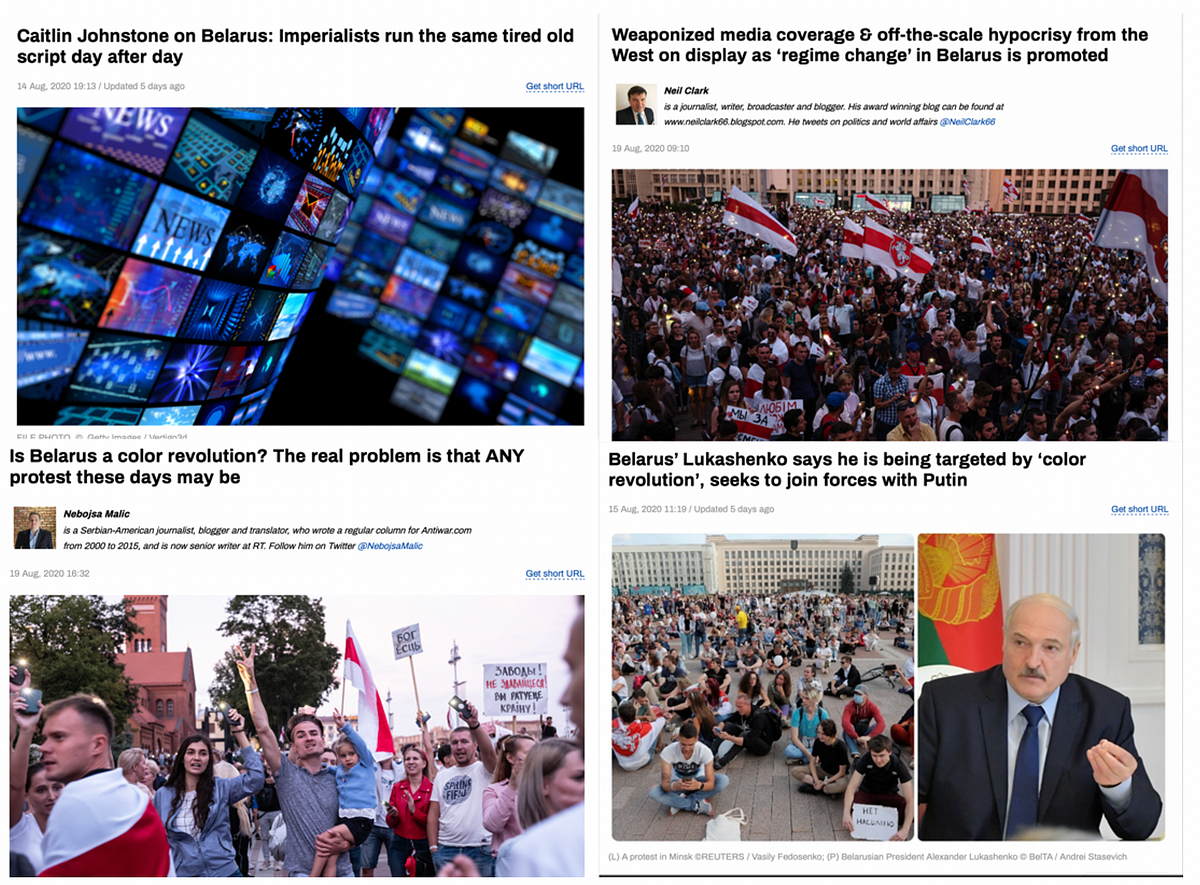
Additionally, content generated by RT and Sputnik sought to equate the violence and electoral interference that occurred due to the election with mass protest movements that took place in Europe over the past year. In doing so, the state-funded outlets attempted to highlight the supposed hypocrisy of democratic governments and the free press in Europe.

RT, meanwhile, highlighted racial divisions in the U.S. over reporting on the protests in Belarus. For instance, instead of reporting on the then-nascent crackdown on Belarusian protesters, on August 10 the outlet premiered a long video on the tenth anniversary of the fatal shooting of Michael Brown by police and the subsequent unrest in Ferguson, Missouri. Following U.S. Secretary of State Mike Pompeo’s supportive August 10 address to the Belarusian protesters, RT published an article highlighting police violence that occurred against peaceful protesters and members of the press during the recent George Floyd protests. Further, RT reported that the U.S. 2020 election will be equally, if not more, rigged than the one that took place in Belarus. RT amplified these stories via its Facebook page and Twitter account, which generally receive low engagement as a result of the platforms’ proactive labeling of the outlet as a part of the Russian government.

Western audiences’ receptivity to the foreign interference narrative
While state-affiliated media in Russia and Belarus have actively promoted the narrative of Western interference in the Belarusian election, Western mainstream media outlets and audiences do not appear to have accepted this claim. The top 15 English-language news articles on the topic of “Belarus election,” which generated over 527,000 engagements, are all sympathetic toward the protesters, questioning the result of the election and Lukashenka’s legitimacy. For example, the most widely engaged-with article, a story published by the Independent, garnered more than 91,000 engagements since it was published on August 17, 2020. It received over 3,300 likes on Facebook, while reactions on Twitter consist predominantly of “love” and “haha” responses, accounting for 82 percent of the total reactions.

In contrast, English-language news articles from pro-Kremlin sources received low engagement from Western audiences. For example, Off-guardian, a news website that has been found to disseminate conspiracy theories before, published an article on August 16 insinuating that the mass protests in Belarus have been under the influence of “EU interference.” Although the article did attract a few sympathetic comments, it only received 286 engagements, according to social media monitoring tool BuzzSumo.

Another example of English coverage regarding the involvement of EU and NATO in Belarus is an article published by the pro-Kremlin outlet The Duran. The story embedded a link to a Russian news article published on Telegraf.lv stating, “It is no coincidence that it was at this time that the Alliance [NATO] was conducting three exercises at once in Poland and Latvia,” implying that NATO was preparing for military intervention into Belarus. Moreover, the Duran article misled its readers in terms of the nature of NATO’s organizational structure in forming allied operations. As noted in a statement by the President of Latvia on August 13, the EU and NATO have urged Belarus to deal with the situation on its own and only offered help of voluntary “mediation” instead of peacekeeping forces.
The sentiment of mainstream social media discussion of Belarus election has so far aligned with mainstream English-media coverage. A DFRLab analysis using the social media analytics tool Brandwatch revealed that mentions of “Belarus” alongside “Russian interference,” “Russian intervention,” “Russia intervention,” and “Russia interference” outside of Russia reached a total of 2,701 between August 10–20, 2020. Despite the low engagement with the “Russian interference” discourse, mentions of EU interference and U.S. interference are even lower: a search for the keyword “Belarus” alongside “EU interference,” “EU intervention,” “European Union interference,” and “European Union intervention” resulted in only 41 mentions during the same time period. Meanwhile, there were only 109 mentions of similar keywords related to U.S. interference in the Belarus election. Despite the efforts of Russian-affiliated media as well as President Putin himself promoting narratives regarding EU intervention in Belarus, Western social media audiences have not embraced these narratives.
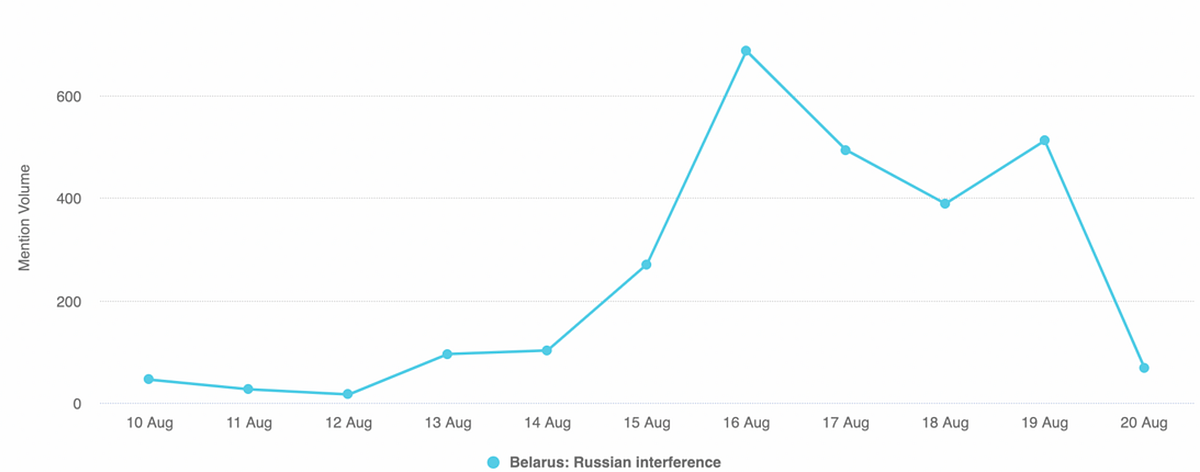
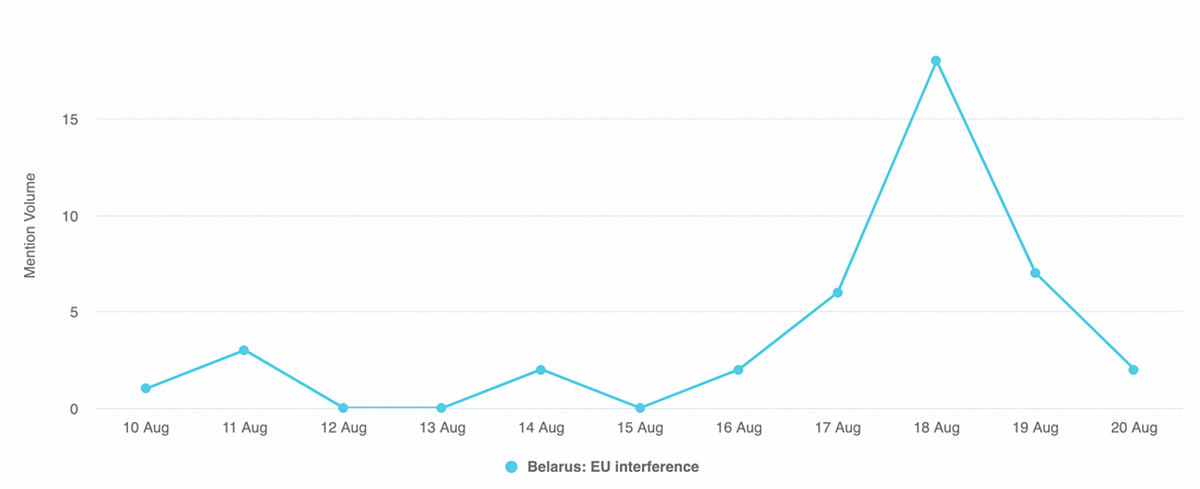
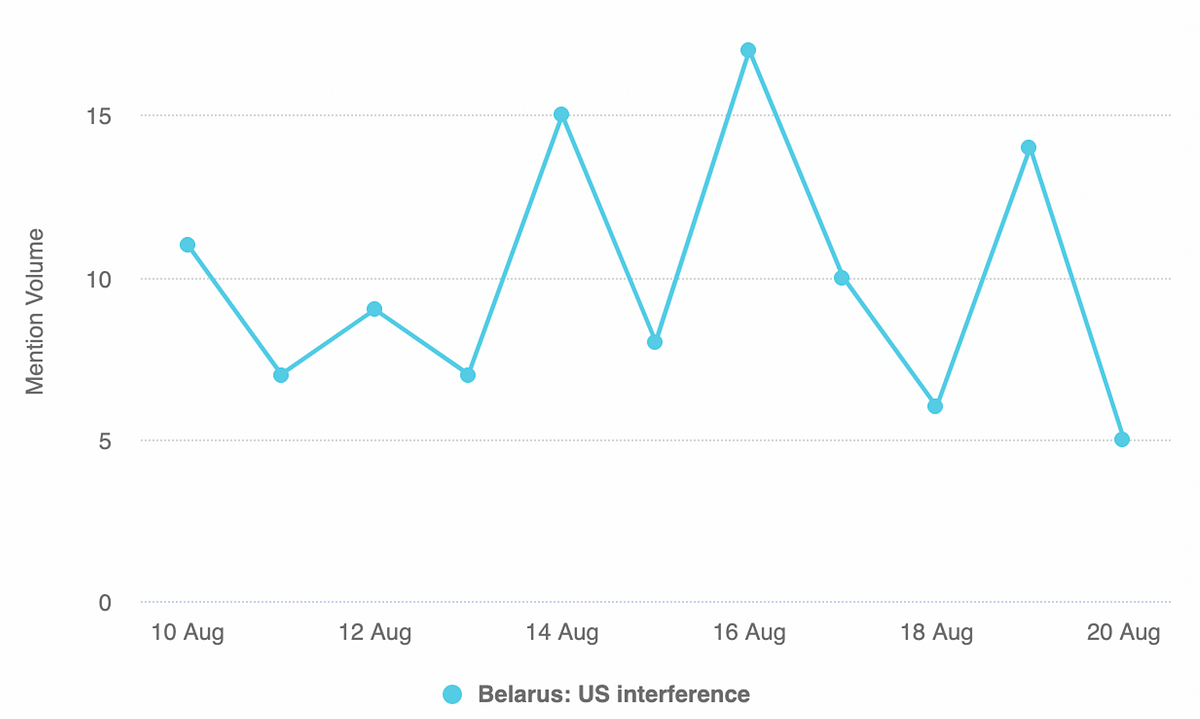
Following the election in Belarus on August 9, both Belarusian and Russian state media reverted to familiar narratives, dismissing genuine protests and legitimate grievances as the consequence of adversarial Western interference and corruption and using the unrest to spread propaganda to support both domestic and foreign policy objectives. While both states attempted to amplify this narrative to Western audiences via their foreign ministries and state-affiliated media channels, these efforts have so far born little fruit.
Jacqueline Malaret is a program assistant at the DFRLab.
Follow along for more in-depth analysis from our #DigitalSherlocks.

